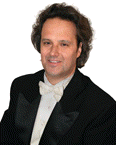|
In
point of fact, the Odessa Philharmonic is the first performing arts
organization in the entire country to have had its funding status
raised by the government of Ukraine from regional to federal to
national, since the independence of Ukraine in 1991.
Hobart
Earle has conducted hundreds of concerts with the Odessa Philharmonic to
wide acclaim -- in the major concert halls of the United States, Canada,
Australia, Great Britain, Germany, Switzerland, Austria, Spain, France,
Greece, Hungary, Bulgaria, Russia and throughout Ukraine. Highlights of
Maestro Earle's career include performances in the Musikverein
(Vienna), the Philharmonie (Cologne), the Beethovenhalle (Bonn), the
Barbican Hall (London), the National Auditorium (Madrid), the Liszt
Academy (Budapest) the Great Halls of the Moscow Conservatory and the
St. Petersburg Philharmonic Society, and in the United States he has
appeared in Carnegie Hall, the Kennedy Center, Orchestra Hall in
Chicago, Davies Hall in San Francisco and the General Assembly of the
United Nations. |
|
Hobart
Earle's festival credits include appearances at such music festivals as
the Bregenz Spring Festival (Austria), the Festival of Perth (Australia),
the Lugano Spring Festival (Switzerland), the Chichester Festivities
(England), the Nuits Musicales du Suquet in Cannes (France), the Budapest
Spring Festival, (Hungary), the Varna Summer Festival (Bulgaria) and the
Cultural Capital of Europe 1997 in Thessaloniki, Greece.
|
|
In
Europe, he has led such orchestras as the Vienna Chamber Orchestra, the
Vienna Tonkuenstler Orchestra, the Noord-Nederlands Orkest in Holland, the
Orchestra della Toscana in Italy, the Athens State Symphony Orchestra, the
Krakow Philharmonic, "Sinfonia Iuventus" in Warsaw and in the U.
S., the Buffalo Philharmonic Orchestra, the North Carolina Symphony, the
Florida Philharmonic Orchestra and the San Diego Chamber Orchestra.
|
|
In
Asia he has been a guest of the Taipei Symphony Orchestra, the Thailand
Philharmonic Orchestra, and the Southeast Asian Youth Orchestra. In
recent years, he has appeared frequently in Russia, with such Moscow
orchestras as the Academic Symphony Orchestra of Russia ("Svetlanov
Symphony Orchestra"), the "Novaya Rossiya" Symphony Orchestra with
Yuri Bashmet and the Moscow State Symphony Orchestra, as well as at the
Philharmonic in St. Petersburg. During the 2010-2011 season he conducted
new productions of "Snowqueen" and "Don Quixote" at the Greek
National Opera in Athens. |
|
In
recognition of his work with the Odessa Philharmonic Orchestra, Hobart
Earle was awarded the title "Distinguished Artist of Ukraine", the
first and only foreigner in the history of Ukraine so honored. Under his
dynamic leadership, the Orchestra has become a great source of pride at
home with the concert hall regularly sold out. One of the most popular
figures in the city of Odessa, Maestro Earle was presented with the
annual "Friend of Ukraine" award by the Washington Group (an
association of Ukrainian/American professionals) on the occasion of the
fifth anniversary of the independence of Ukraine in 1996. He was the
first person in the arts to receive the award. In 2003, in
conjunction with leading newspapers in Ukraine, the Russian Cosmonaut
Association named a star in the "Perseus" constellation as "Hobart
Earle". |
|
As
founder and music director of the American Music Ensemble
Vienna/Ensemble for Viennese Music New York from 1987-1991, Hobart Earle
premiered many works by living composers in addition to reviving several
lesser-known compositions from the late nineteenth and early twentieth
centuries. During his tenure in Odessa, Hobart Earle has also led
numerous performances of repertoire never before heard there. In
particular, he is the first conductor to perform such major works in
Odessa as: Gustav Mahler's 2nd, 3rd, 6th and 9th symphonies, Anton
Bruckner's 8th symphony, Richard Strauss's "Four Last
Songs", Elgar's "Enigma" Variations, Alban Berg's "3
Excerpts from Wozzeck", Gustav Holst's "The Planets",
Aaron Copland's "El Salon Mexico" and "Lincoln
Portrait" and Leonard Bernstein's "Jeremiah" symphony. |
|
Hobart
Earle and the American Music Ensemble Vienna can be heard on two world
premiere CDs of American Music on the Albany Records label, including
music by George Whitefield Chadwick, Henry Gilbert and Miguel del
Aguila. On the ASV label, Maestro Earle has recorded two highly
acclaimed CDs with the Odessa Philharmonic Orchestra of previously
unrecorded music by Ukrainian composers Mykola Kolessa, Myroslav Skoryk,
Yevhen Stankovych and Reinhold Gliere. His performance of Tchaikovsky's
5th symphony with the Odessa Philharmonic Orchestra in
Vienna's Musikverein in 2001 was recorded by the Austrian Radio live
in concert, and awarded "Best Classical Album 2002" at the
"JPFolks Music Awards" in Hollywood, California. |
|
He
was a student of Ferdinand Leitner in Salzburg and Leonard Bernstein and
Seiji Ozawa at Tanglewood. Hobart Earle studied conducting at the
Academy of Music in Vienna; received a performer's diploma in clarinet
from Trinity College of Music, London; and is a magna cum laude graduate
of Princeton University. In 2007, he was awarded the title of
"honorary professor" of the Academy of Music in Odessa. |
|
|
|
|
|

|
|
|
